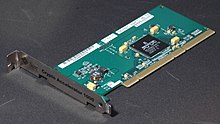
Back تسريع عتاد الحاسوب Arabic Acceleració per maquinari Catalan Hardwarová akcelerace Czech Hardwarebeschleunigung German Aceleración por hardware Spanish Riistvaraline kiirendamine Estonian Hardware bidezko azelerazio Basque شتابدهنده سختافزاری Persian Laitteistokiihdytys Finnish Accélération matérielle French
This article needs additional citations for verification. (September 2014) |

Hardware acceleration is the use of computer hardware designed to perform specific functions more efficiently when compared to software running on a general-purpose central processing unit (CPU). Any transformation of data that can be calculated in software running on a generic CPU can also be calculated in custom-made hardware, or in some mix of both.
To perform computing tasks more efficiently, generally one can invest time and money in improving the software, improving the hardware, or both. There are various approaches with advantages and disadvantages in terms of decreased latency, increased throughput and reduced energy consumption. Typical advantages of focusing on software may include greater versatility, more rapid development, lower non-recurring engineering costs, heightened portability, and ease of updating features or patching bugs, at the cost of overhead to compute general operations. Advantages of focusing on hardware may include speedup, reduced power consumption,[1] lower latency, increased parallelism[2] and bandwidth, and better utilization of area and functional components available on an integrated circuit; at the cost of lower ability to update designs once etched onto silicon and higher costs of functional verification, times to market, and need for more parts. In the hierarchy of digital computing systems ranging from general-purpose processors to fully customized hardware, there is a tradeoff between flexibility and efficiency, with efficiency increasing by orders of magnitude when any given application is implemented higher up that hierarchy.[3] This hierarchy includes general-purpose processors such as CPUs,[4] more specialized processors such as programmable shaders in a GPU,[5] fixed-function implemented on field-programmable gate arrays (FPGAs),[6] and fixed-function implemented on application-specific integrated circuits (ASICs).[7]
Hardware acceleration is advantageous for performance, and practical when the functions are fixed so updates are not as needed as in software solutions. With the advent of reprogrammable logic devices such as FPGAs, the restriction of hardware acceleration to fully fixed algorithms has eased since 2010, allowing hardware acceleration to be applied to problem domains requiring modification to algorithms and processing control flow.[8][9] The disadvantage however, is that in many open source projects, it requires proprietary libraries that not all vendors are keen to distribute or expose, making it difficult to integrate in such projects.
- ^ "Microsoft Supercharges Bing Search With Programmable Chips". WIRED. 16 June 2014.
- ^ "Embedded". Archived from the original on 2007-10-08. Retrieved 2012-08-18. "FPGA Architectures from 'A' to 'Z'" by Clive Maxfield 2006
- ^ Sinan, Kufeoglu; Mahmut, Ozkuran (2019). "Figure 5. CPU, GPU, FPGA, and ASIC minimum energy consumption between difficulty recalculation.". Energy Consumption of Bitcoin Mining. doi:10.17863/CAM.41230.
- ^ Kim, Yeongmin; Kong, Joonho; Munir, Arslan (2020). "CPU-Accelerator Co-Scheduling for CNN Acceleration at the Edge". IEEE Access. 8: 211422–211433. doi:10.1109/ACCESS.2020.3039278. ISSN 2169-3536.
- ^ Lin, Yibo; Jiang, Zixuan; Gu, Jiaqi; Li, Wuxi; Dhar, Shounak; Ren, Haoxing; Khailany, Brucek; Pan, David Z. (April 2021). "DREAMPlace: Deep Learning Toolkit-Enabled GPU Acceleration for Modern VLSI Placement". IEEE Transactions on Computer-Aided Design of Integrated Circuits and Systems. 40 (4): 748–761. doi:10.1109/TCAD.2020.3003843. ISSN 1937-4151. S2CID 225744481.
- ^ Lyakhov, Pavel; Valueva, Maria; Valuev, Georgii; Nagornov, Nikolai (2020-12-18). "A Method of Increasing Digital Filter Performance Based on Truncated Multiply-Accumulate Units". Applied Sciences. 10 (24): 9052. doi:10.3390/app10249052. ISSN 2076-3417.
Hardware simulation on FPGA increased the digital filter performance.
- ^ Mohan, Prashanth; Wang, Wen; Jungk, Bernhard; Niederhagen, Ruben; Szefer, Jakub; Mai, Ken (October 2020). "ASIC Accelerator in 28 nm for the Post-Quantum Digital Signature Scheme XMSS". 2020 IEEE 38th International Conference on Computer Design (ICCD). Hartford, CT, USA: IEEE. pp. 656–662. doi:10.1109/ICCD50377.2020.00112. ISBN 978-1-7281-9710-4. S2CID 229330964.
- ^ Morgan, Timothy Pricket (2014-09-03). "How Microsoft Is Using FPGAs To Speed Up Bing Search". Enterprise Tech. Retrieved 2018-09-18.
- ^ "Project Catapult". Microsoft Research.
© MMXXIII Rich X Search. We shall prevail. All rights reserved. Rich X Search